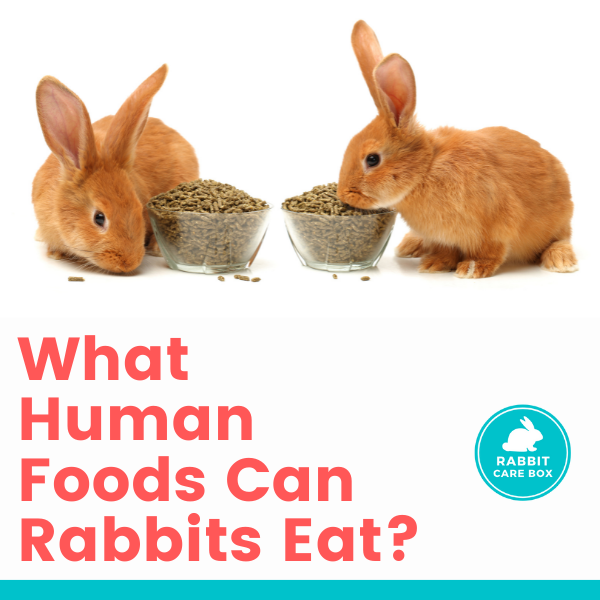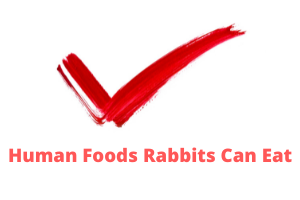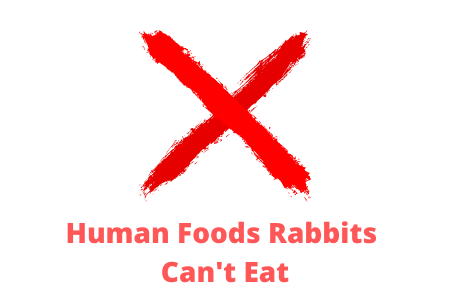Page Contents
What human foods can rabbits eat is a question we get asked a lot here. You’ll be pleased to know you can give carrots, lettuce, celery, pineapple, broccoli leaves, and many other human foods to your rabbit. It is worth mentioning however, that some human foods can be harmful to your tiny friend. Therefore, you will have to avoid any unknown food. Also, the main food source needs to be whey wheat. It should be eighty percent of your bunny’s diet. Yes, you can use some human foods as a treat.

Do Rabbits Eat Human Foods?
Rabbits love human foods. Also, they have sweet taste buds. These creatures love to explore something new when it comes to foods. However, many human foods can be toxic to them. If you want to add human foods to your pet’s diet, you will have to choose safe options.
In brief, you will have to focus on those human foods bunnies can eat safely. As stated earlier, rabbits can eat many human foods. You can give some fruits to satisfy their cravings. But, you will have to avoid sugar, chocolates, and many other human foods.
Why Should You Avoid Some Human Foods?
There are many safe and healthy human foods bunnies can eat. However, all human foods are not safe. More importantly, you should not feed any cooked food to your pet. Cooked foods can be dangerous to these creatures.
They have a sensitive digestive system. Therefore, they cannot digest a lot of foods that include sugar and cooked foods. Their digestive systems can only digest raw plants.
Rabbits are known for their complex gut flora. They can digest resistant and tough plant matter. However, their digestive system is sensitive to some human foods. If your pet consumes some unhealthy human foods accidentally, you will have to visit your vet immediately.
What Should Be a Normal Diet for A Rabbit?
Even though rabbits can eat some human foods, it should not be the major source of their food intake. While preparing your pet’s diet, you will have to focus on rabbit-friendly foods. You will have to choose healthy and nutritious foods. Also, you will have to focus on the downsides.
Some healthy foods can impact the sensitive digestive system of your rabbit. In brief, all the healthy foods are not beneficial for your pet. Therefore, you should talk to your vet before adding any new food to your pet’s diet.
When it comes to your bunny’s diet, you can add grass hay, leafy green vegetables, timothy hay pellets, and fresh water. Fresh hay should be abundant. We can say the same for water. Your pet rabbit needs to drink adequate water to support digestion. However, leafy green vegetables should not be more than ten percent of your pet’s diet. Also, you can give a small portion of fruits as a treat occasionally. But, fruits do not offer any nutritional value to bunnies.
Human Foods Bunnies Can Eat

Your bunny can enjoy some of your favorite foods. However, you will have to take care of the portion to avoid any stomach issues. Also, rabbits cannot vomit, and they can develop severe stomach issues. Therefore, you will have to treat any stomach discomfort immediately to avoid further complications. When it comes to human foods that bunnies can eat, you can consider the fofollowing.
- 1. Carrots
Rabbits like carrots, and you can serve this vegetable to your pet. However, you will have to use carrots as treats. Carrot is rich in sugar, and it can cause stomach discomfort when taken in excess. Too much consumption can lead to digestive issues. On top of that, your pet can gain weight. However, carrots are rich in Vitamin A and can improve the eye health of the bunny. You can give carrot tops since they are rich in Vitamin C, Vitamin A, potassium, folate, Vitamin K, niacin, manganese, and Vitamin B6. But you should avoid giving carrot roots to your pet.
- 2. Lemon Balm
Rabbits can eat lemon balm and get rid of stomach issues naturally. It has antibacterial properties and can help with diarrhea, bloating gas, anxiety, and stress in rabbits. You can add it to the daily diet of your bunny. However, some bunnies might develop stomach issues after having lemon balm. Therefore, you will have to observe your bunny for forty-eight hours after serving lemon balm. If the lemon balm does not cause any side effects, you can use it whenever neneeded.
- 3. Cilantro
Cilantro is rich in minerals and vitamins. This herb has riboflavin, iron, calcium, vitamin A, folate, zinc, thiamin, vitamin C, niacin, vitamin K, vitamin C, and vitamin B6. All these nutrients make it a safe human food for rabbits. However, your pet might not like the flavor of cilantro. Therefore, you will have to offer cilantro in a small portion. If your pet experiences any side effects, you will have to stop immediately.
- 4. Celery
Another rabbit-friendly human food is celery. Celery is rich in calcium, folic acid, potassium, vitamin B6, vitamin B2, and vitamin B1. All these nutrients and vitamins make celery a healthy food for your bunny. Also, celery has phytochemical compounds. That can help to fight inflammation. These compounds can lower blood pressure as well. In addition to all these benefits, celery can prevent cancer. You will have to offer celery in moderation. If you want, you can also add celery leaves and tops to your pet’s diet.
- 5. Blueberries
Your rabbit should not eat any food that has seeds. But, you can give blueberries since the tiny seeds will not harm your pet in any manner. However, you can remove the seeds before offering blueberries to your pet. Blueberries contain antioxidants and minerals. This fruit can support the brain health of your pet. Apart from that, the glycemic index is low in blueberries. Another benefit is that blueberries do not contain much sugar. However, you will have to offer blueberries in moderation and make sure that you are giving only fresh blueberries.
- 6. Pineapple
Many of us throw pineapple’s central part. However, the central part of pineapple has bromelain. This enzyme can cure diarrhea in rabbits. Therefore, you will have to offer that part of pineapples to your pet to maximize the benefits. Avoid giving frozen pineapples and offer only in a small quantity. It is worth mentioning that pineapple is rich in sugar, and excess consumption might lead to diarrhea, obesity, and other digestive issues. Also, pineapple is acidic and can impact the teeth of your pet.
- 7. Lettuce
You can give lettuce to your bunny. But make sure that you are giving only fibrous and leafier lettuce. You can choose romaine lettuce. It is rich in fiber. Also, it has some nutrients that include calcium, magnesium, potassium, phosphorous, folate, vitamin C, and vitamin K. Another benefit is that lettuce is low in calories. Therefore, your bunny will not experience weight gain. However, you will have to avoid iceberg lettuce. It has the lactucarium chemical. That can be toxic to your pet.
- 8. Broccoli Leaves
If you want a fibrous vegetable for your rabbit, you can think of broccoli leaves. These are rich in fibers and low in calories. Also, broccoli leaves contain niacin, thiamin, vitamin A, folate, selenium, iron, pantothenic acid, and calcium. All these will help to meet the nutritional needs of bunnies.
- 9. Kale
You can give kale to your non-human friend. It is as healthy as broccoli. As kale is rich in vitamin A, it can improve your pet’s vision and fur health. Also, kale is loaded with vitamin K and vitamin C. It is worth mentioning that rabbits can produce vitamin C. However, other nutrients of kale can support the immunity of your pet. The bunny will get an adequate amount of magnesium, calcium, and iron from kale as well. However, you will have to give only in small quantity. Otherwise, your pet might experience some stomach issues that include gas and bloating.
- 10. Basil
You might be aware of the beneficial properties of basil. It has anti-inflammatory and antibacterial properties. Also, rabbits can digest it easily. Another benefit of basil is that it contains flavonoids. That can prevent any damage due to metabolic waste.
- 11. Arugula
Arugula can be a safe option for rabbits. It can improve the oral health of your pet. Arugula is an excellent source of calcium. Also, it has vitamin B9 and folic acid. Both these can minimize the risk of heart diseases in rabbits. Also, arugula has fiber, water, and protein in small quantities. Instead of adding arugula to your pet’s daily diet, you can offer a small amount a couple of times a week. Too much consumption might increase the calcium to a dangerous level.
- 12. Boy Choy
You can also add Boy Choy to your pet’s diet. It can be a healthy option for adult rabbits due to its low oxalic levels. Also, you should not give any fresh food to a baby rabbit until the pet reaches six months. Before giving Boy Choy, make sure that you are washing the leaves properly. Also, you can soak them in water for a few hours, and then you can serve them to your pet. Otherwise, the harmful chemicals and pesticides might harm your pet.
- 13. Oats
All the above human foods bunnies can eat without experiencing any stomach comfort. Another such food is oatmeal. Oat is easy to digest, and it is less expensive as well. When it comes to benefits, oats can minimize diabetes risk. You can consider this human food for an underweight rabbit.
- 14. Asparagus
Another healthy human food that rabbits can eat is asparagus. It is high in fiber and water. Also, the calorie level is low in asparagus. Apart from that, asparagus is rich in vitamin C, vitamin E, vitamin A, folate, chromium, and vitamin K. These nutrients make it a healthy option for rabbits.
- 15. Apples
You can use apples as a treat to satisfy the sugar cravings of your pet. Apples are rich in antioxidants and fiber. Also, it contains potassium, phytonutrients, B-complex vitamins, and calcium. However, apples have rich sugar contents. Therefore, you will have to feed in moderation. While feeding apples, you can leave the skin. But make sure that you are removing seeds, core, and stem since they contain cyanide. Cyanide can cause stomach issues.
Rabbits can eat all the human foods mentioned above. However, you will have to avoid feeding regularly or in excess quantity. In both these conditions, your pet might experience a lot of health issues. The key is to feed in moderation when you are adding human foods. Also, you will have to avoid some human food under any circumstances. Some human foods can be harmful to your pet.
Human Foods Rabbits Cannot Eat

- Grains: You will have to avoid grains and products made from grains. Grains can cause digestive blocks. However, oats will not cause harm when taken in moderation.
- Beans: Any form of beans that include cooked and raw beans can cause digestion issues.
- Potatoes: The toxic compounds in potatoes, solanine, can be deadly for your pet.
- Sugary Foods: Refined sugar and processed foods can impact the sensitive digestive system of bunnies. You will have to avoid candies and cookies in all forms.
- Chocolate: Chocolates have theobromine compounds. Rabbits’ digestive system lacks the required digestive enzyme that can break theobromine down. Therefore, your pet can develop severe stomach issues after eating chocolates. If you notice that your pet has eaten some chocolates accidentally, you will have to visit your vet straightaway.
- Cooked Foods: Rabbits cannot digest cooked foods. Their digestive system does not have the enzyme to process cooked foods. Therefore, cooked foods cause severe gastrointestinal distress in rabbits.
In addition to these, rabbits cannot eat nuts, alliums, rhubarb, caffeinated foods, and many other human foods.
Now you know which human foods bunnies can eat and which they cannot. However, you will have to take extra caution while introducing any new food to your bunny. Also, healthy food can cause stomach distress when taken in excess. Therefore, you will have to start slow and observe the impact. If your pet is not having any stomach discomfort, you can occasionally use that food as a treat.